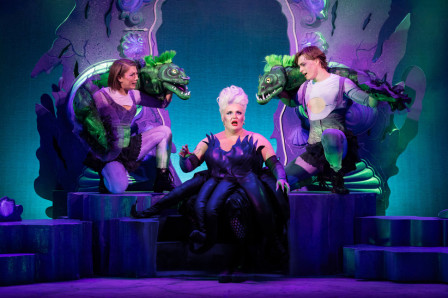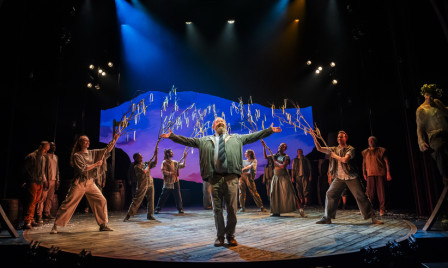Review: THE CONVERT, Above the Stag Theatre (Vauxhall)
 Taken to The Facility, an institution for corrective measures which exists in an unspecified future time and place, we learn how two inmates Alix and Marcus undergo curative therapy and hope to avoid being sent to the Other Place from which no-one ever returns.
Taken to The Facility, an institution for corrective measures which exists in an unspecified future time and place, we learn how two inmates Alix and Marcus undergo curative therapy and hope to avoid being sent to the Other Place from which no-one ever returns.
Gene David Kirk directs Ben Kavanagh’s gay play whose simple premise is that to escape the institution and return safely to society, inmates must overcome and reject loving one another in an environment where that same love is the only thing which sustains their hope, fortitude and humanity. It presents a cruel and unwinnable paradox.
The intimate Stag Theatre located above an intimate Vauxhall drinking establishment, seems to have a penchant for presenting plays of an intimate nature, despite the inherent interruption of the continuous otherworldly rumbling of commuter trains trundling above the arches overhead. Beneath (and in spite of) this audible backdrop, the protagonist internees played by Nick Mower and Sam Goodchild talk of their differing approaches to their similar predicaments of incarceration and unwelcome rehabilitation (aka brainwashing) and engage in moments of intimacy and gentle kindness. Such moments offer a modicum of relief from the dystopian cruelty meted out by The Arbiter played here by the play’s author Ben Kavanagh. His latent otherness and mild-mannered-yet-sinister interrogating style may lack a white coat, but still put this reviewer in mind of Laurence Olivier’s theatrical turn in The Marathon Man. The bullying may be understated and even deadpan, but it is unrelenting and gradually wears down resistance and with it, every last vestige of hope for a humane and caring society. Youthful challenges and sparks of questioning resistance are snuffed-out with punishment and ground down by the passing of time.
Unfortunately, what starts out as the play’s well-researched and well-intentioned idea, meanders and ends up grinding down its audience — especially when false endings are presented and then abandoned in favour of a rather lame Streisand-themed torch song to fill the gap where the clever and optimistic ending should have been.
The dialogue interplay is delivered crisply enough and presented on a cleverly lit and snappily designed set — Joseph Ed Thomas and David Shields, working wonders with no doubt a very limited budget — but the narrative thread demonstrably lacked purpose (unless that purpose was to leave the audience feeling dispirited and then offer some mild physical titillation as compensation).
Latest News

 Review: TUTU at Sadler’s Wells East
12 February 2026 at 08:52
Review: TUTU at Sadler’s Wells East
12 February 2026 at 08:52

 Is The Great Gatsby, starring Regé-Jean Page, heading to the West End?
11 February 2026 at 15:40
Is The Great Gatsby, starring Regé-Jean Page, heading to the West End?
11 February 2026 at 15:40

 Production photos of UNFORTUNATE: THE UNTOLD STORY OF THE SEA WITCH released
11 February 2026 at 15:14
Production photos of UNFORTUNATE: THE UNTOLD STORY OF THE SEA WITCH released
11 February 2026 at 15:14

 Review Round-Up: THE UNLIKELY PILGRIMAGE OF HAROLD FRY at the Theatre Royal Haymarket
11 February 2026 at 14:19
Review Round-Up: THE UNLIKELY PILGRIMAGE OF HAROLD FRY at the Theatre Royal Haymarket
11 February 2026 at 14:19